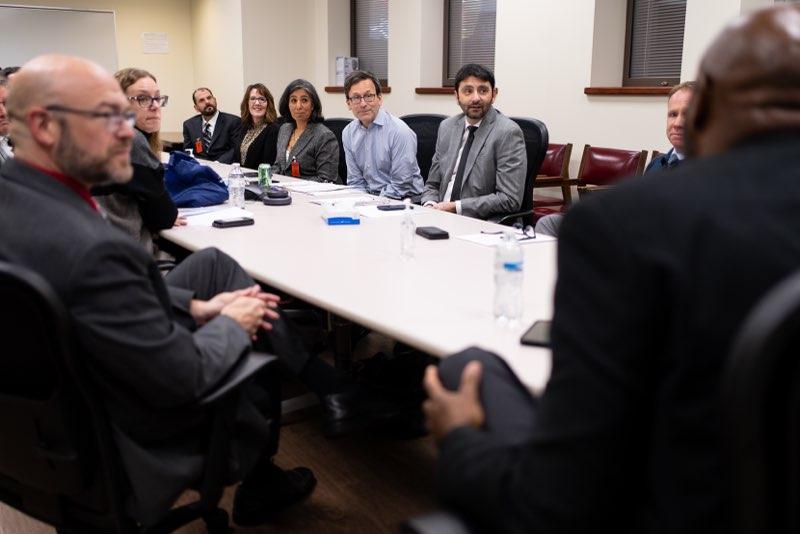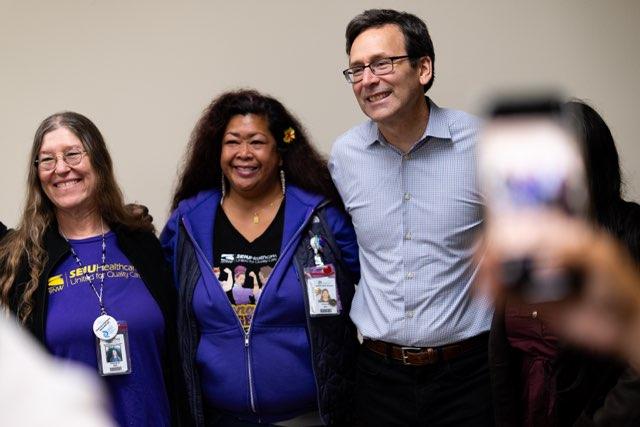Extended visit included tours of existing facilities and construction site for new forensic hospital, as well as meetings with leadership, staff, patients

LAKEWOOD — Today Governor Bob Ferguson concluded his week working at Western State Hospital, fulfilling a commitment he made before taking office. Ferguson met with hospital and Department of Social and Health Services (DSHS) leadership, as well as patients, staff and labor leaders. Ferguson also toured existing facilities and the site of the new forensic hospital, which is expected to open in 2028.
Ferguson held a press availability today at the conclusion of his week at Western State Hospital, along with DSHS Secretary Angela Ramirez and hospital leadership.
“It was a privilege to see firsthand the resilience of patients and the dedication of staff at Western State Hospital. This hospital plays an essential role in Washington’s behavioral health system,” Governor Ferguson said. “This week we learned a lot about the patient journey, how our behavioral health care system is working, and how we can do better. I look forward to taking what we learned and putting it into action.”
“I want to thank Governor Ferguson for delving into the work that is happening at Western State Hospital,” said Angela Ramirez, DSHS Secretary. “We know the staff and community put a lot into supporting WSH and its patients — it was great to see it in action this week. As we strive to make WSH and the continuum of care even better, the staff and the people we serve will always be top of mind.”
Ferguson spent much of Monday through Thursday at the hospital grounds in meetings and tours, learning about the operations of the 350-bed hospital and its behavioral health care for patients in civil and forensic wards.
A majority of patients at Western State Hospital are forensic patients, meaning they either are not competent to stand trial on offenses for which they have been charged or they are found not guilty by reason of insanity at trial. Western State Hospital also provides treatment for civilly committed patients, the majority of which convert from forensic status.

Among the tours this week, on Wednesday, Ferguson visited the Child Study and Treatment Center, where he met the young people engaged in treatment and recovery as well as the staff dedicated to supporting their well-being.
Other highlights from Ferguson’s week at Western State Hospital include:
- A tour of the construction site for Western State’s new forensic hospital, which is expected to accept its first patients in August 2028. It will have approximately 350 beds that will replace existing capacity at WSH’s older facilities. The new hospital is designed to provide compassionate, evidence-based behavioral health care for individuals involved in the court system. That project is on time and on budget.
- A tour of the Gage Center, which provides specialized forensic services for patients committed through the criminal court system. This tour included a visit to the brand-new Treatment and Recovery Center facility forensic patients who have been found Not Guilty by Reason of Insanity. The new facility, expected to open in 2026, has classrooms, a library, a gym, kitchen facilities, a barber shop, and other amenities to help patients approaching their release date acclimate to normal life, as well as cultivate useful skills and independence.
- Meetings with representatives from SEIU 1199 (union representing nurses), Washington Federation of State Employees (WFSE), Union of Physicians of Washington, and Affiliated Washington Pharmacists.
- A tour of the Western State Hospital Museum, where the hospital’s 150-year history and evolution of behavioral health methods is on display.

Additionally, following his week at Western State Hospital, Ferguson participated in a roundtable discussion with behavioral health leaders and elected officials in Pierce County.
In recent years, community behavioral health providers have experienced significant change but have been overlooked in conversations about the behavioral health system. Those conversations can be more centered on developing inpatient facilities rather than early intervention and other efforts to help Washingtonians with behavioral health conditions to thrive in community and manage their conditions. Today’s roundtable brought together relevant stakeholders to discuss a broader vision for behavioral health and how leadership can achieve that vision.



